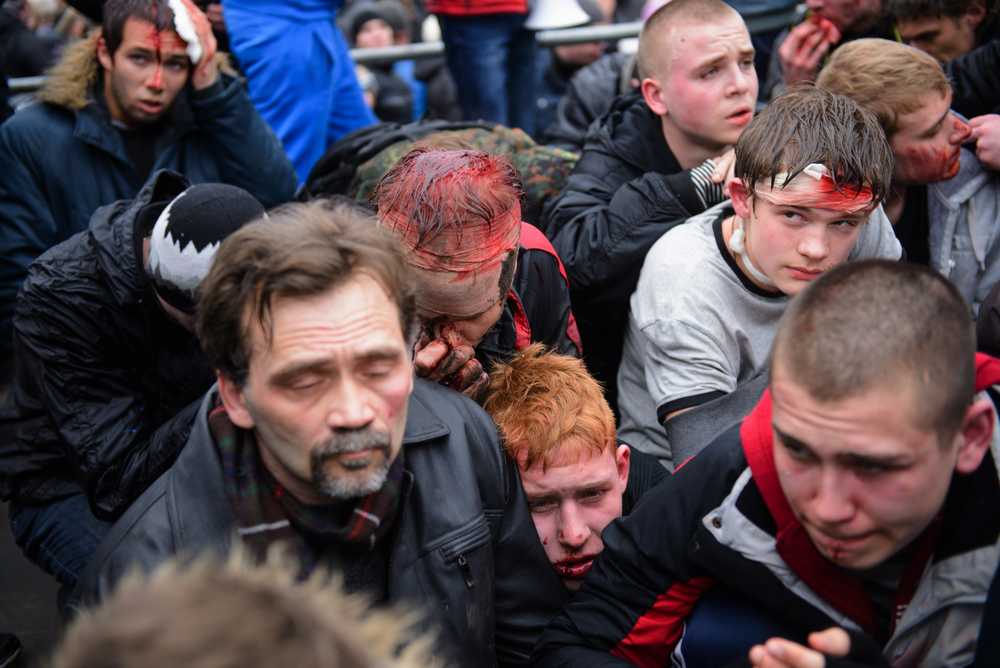SIMFEROPOL, Ukraine (AP) — Russian troops took over Crimea as the parliament in Moscow gave President Vladimir Putin a green light Saturday to use the military to protect Russian interests in Ukraine. The newly installed government in Kiev was powerless to react to the action by Russian troops based in the strategic region and more flown in, aided by pro-Russian Ukrainian groups.
Putin sought and quickly got his parliament’s approval to use its military to protect Russia’s interests across Ukraine. But while sometimes-violent pro-Russian protests broke out Saturday in a number of Russian-speaking regions of eastern Ukraine, Moscow’s immediate focus appeared to be Crimea.
Tensions increased when Ukraine’s acting president, Oleksandr Turchynov, made a late night announcement that he had ordered the country’s armed forces to be at full readiness because of the threat of “potential aggression.”
Speaking live on Ukrainian TV, Turchynov he had also ordered stepped up security at nuclear power plants, airports and other strategic infrastructure.
Ignoring President Barack Obama’s warning Friday that “there will be costs” if Russia intervenes militarily, Putin sharply raised the stakes in the conflict over Ukraine’s future evoking memories of Cold War brinkmanship.
After Russia’s parliament approved Putin’s motion, U.S. officials held a high-level meeting at the White House to review Russia’s military moves in Ukraine. The U.N. Security Council started an open and televised meeting on the growing crisis in Ukraine, despite objections from Russia.
“Russia and the West find themselves on the brink of a confrontation far worse than in 2008 over Georgia,” Dmitri Trenin, the director of Carnegie Moscow Center, said in a commentary posted on its website. In Georgia, Russian troops quickly routed the Georgian military after they tried to regain control over the separatist province of South Ossetia that has close ties with Moscow.
The latest moves followed days of scripted, bloodless turmoil on the peninsula, the scene of centuries of wars and seen by Moscow as a crown jewel of the Russian and Soviet empires. What began Thursday with the early-morning takeover of the regional parliament building by mysterious troops continued Saturday afternoon as dozens of those soldiers — almost certainly Russian — moved into the streets around the parliamentary complex and seized control of regional airports, amid street protests by pro-Russian Crimeans calling for Moscow’s protection from the new government in Kiev.
That government came to power last week in the wake of months of pro-democracy protests against the now-fugitive president, Viktor Yanukovych, and his decision to turn Ukraine toward Russia, its longtime patron, instead of the European Union. Despite the calls for Moscow’s help, there has been no sign of ethnic Russians facing attacks in Crimea or elsewhere in Ukraine.
Ukraine’s population of 46 million is divided in loyalties between Russia and Europe, with much of western Ukraine advocating closer ties with the European Union while eastern and southern regions look to Russia for support. Crimea, a semi-autonomous region that Russia gave to Ukraine in the 1950s, is mainly Russian-speaking.
In his address to parliament, Putin said the “extraordinary situation in Ukraine” was putting at risk the lives of Russian citizens and military personnel stationed at the Crimean naval base that Moscow has maintained since the Soviet collapse.
Despite Putin’s sharp move, there were possible signs Saturday that the Russian leader could soften his approach. Former Ukrainian Prime Minister Yulia Tymoshenko, who was freed a week ago after more than 2 ½ years in prison, was reported to be heading to Moscow for a meeting with Putin on Monday. Putin has had good ties with Tymoshenko in the past, and he may look to her for a possible compromise.
Putin’s motion loosely refers to the “territory of Ukraine” rather than specifically to Crimea, raising the possibility that Moscow could use military force in other Russian-speaking areas in eastern and southern Ukraine, where many detest the new authorities in Kiev.
Pro-Russian protests were reported Saturday in the eastern cities of Kharkiv, Donetsk and Luhansk and the southern port of Odessa. In Kharkiv, 97 people were injured in clashes between pro-Russia demonstrators who flushed supporters of the new Ukrainian government out of the regional government building and hoisted the Russian flag on top of it, according to the Interfax news agency.

